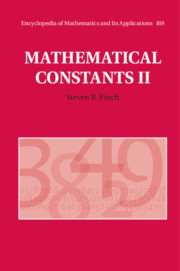'Like the best sequels, this one covers similar ground to the original but finds ways to stay fresh and interesting … any mathematician or math student who picks it up and spends a few minutes with it is likely to find something that is new and of interest to them. … Finch has once again written a collection of essays about a wide range of topics that I expect I will enjoy flipping through for another decade and a half until I look forward to having Volume III land on my desk.'
Darren Glass
Source: MAA reviews
'This is a remarkable book … [which] can be thought of as a collection of essays that recount stories that are both successful and tangible.'
Paul F. Bracken
Source: MathSciNet
‘Some of the most intriguing formulas of mathematics (like those of Ramanujan) adorn this treasure trove of mathematical gems … Steven R. Finch’s incredible labor of love, an encyclopedia of mathematical constants … contain a total of 269 meticulously documented essays from all fields of mathematics.’
Osmo Peokonen
Source: The Mathematical Intelligencer
‘Taken together, Mathematical Constants and Mathematical Constants II form a comprehensive and unique work that is a welcome addition to the mathematician’s reference library.'
Steven R. Finch
Source: Notices of the AMS
‘Great care is taken about numerical results and the precise determination of constants. The choice of the material complements the first volume; overall, the topics seem also to be more advanced, but every now and then there is a little pearl which is indeed accessible at high school level. The text is certainly not intended for linear reading - although this might well be possible - but for eclectic readers who want to enjoy themselves and broaden their horizons, or for researchers who need information on a particular constant and further stepping stones.’
Rene L. Schilling
Source: The Mathematical Gazette
‘Great care is taken about numerical results and the precise determination of constants. The choice of the material complements the first volume; overall, the topics seem also to be more advanced, but every now and then there is a little pearl which is indeed accessible at high school level. The text is certainly not intended for linear reading - although this might well be possible - but for eclectic readers who want to enjoy themselves and broaden their horizons, or for researchers who need information on a particular constant and further stepping stones.’
Rene L. Schilling
Source: The Mathematical Gazette



